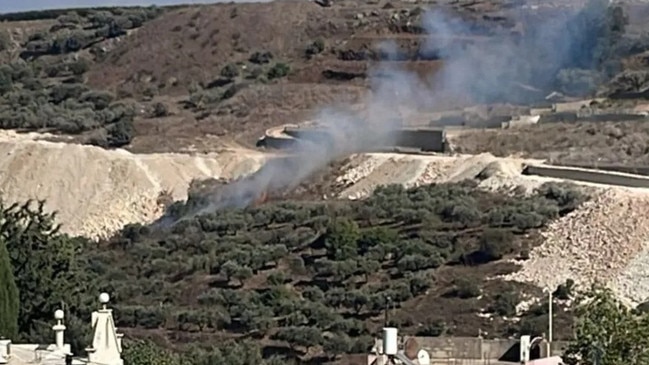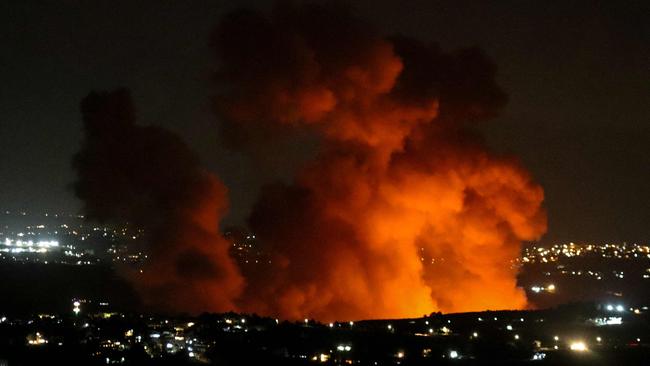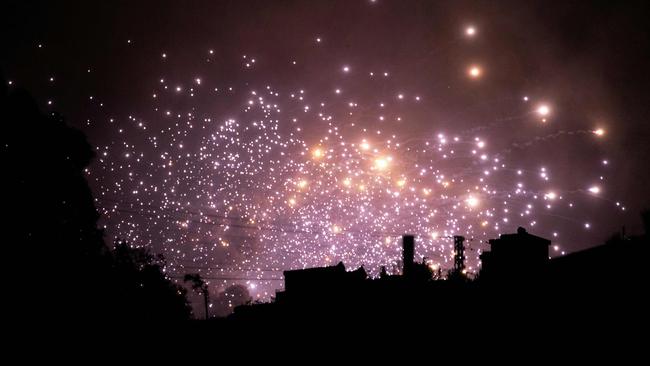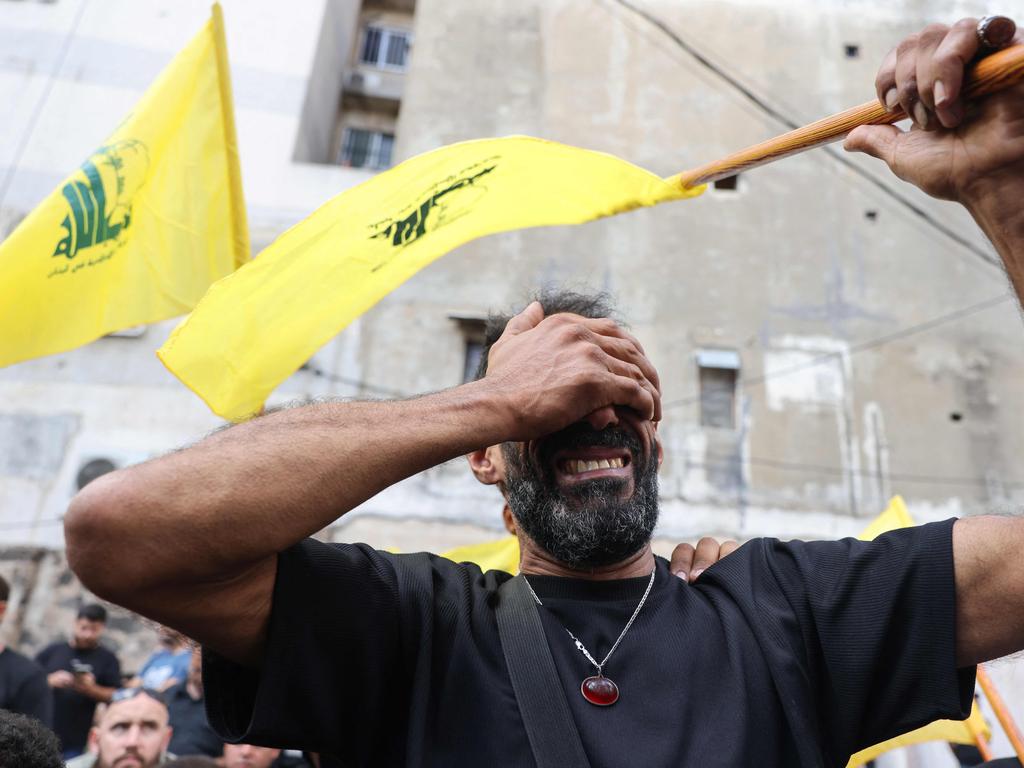Hezbollah fires 10 rockets into Israel
Hezbollah targeted the Israeli Air Force’s Ramat David Airbase, about 50km from the Lebanon border, in the deepest rocket fire into Israel since October.

Hezbollah has fired 10 rockets from Lebanon into northern Israel in response to recent strikes by Israel.
The attack is Hezbollah’s deepest rocket fire into Israel since October.
Hezbollah claimed responsibility for the rocket fire on the Jezreel Valley that was targeting the Israeli Air Force’s Ramat David Airbase, about 50km from the Lebanon border.
While the terror group claimed to have launched dozens of rockets at the airbase, the IDF said only 10 had crossed the border with the majority of those intercepted.
Northern Israel now: Crazy rocket interceptions ongoing.
— Leslie Young ✡︎ (@AkaLazarus) September 21, 2024
View appears to be from the bay at Haifa. 🚀
Iron Dome, do your job 🙠pic.twitter.com/Z5QjidDBQE
A man was “very lightly scratched” by shrapnel from an interception near a village in the Lower Galilee, according to a spokesperson for Israel’s national emergency service MDA.
“MDA medics and paramedics are providing treatment at the scene for a 60-year-old man in a very mild condition,” the spokesperson said.
Israeli police said falling debris from projectiles fired from Lebanon had caused a fire and damaged property in Israel’s Northern District.
Firefighting units are working to contain the flames, while police bomb disposal experts are searching the area, authorities said.
Israeli warplanes pound Lebanon
Earlier, Israeli warplanes pounded southern Lebanon, a day after an Israeli strike on Beirut left senior Hezbollah commanders among the 37 people Lebanese officials reported killed.
Dozens of Israeli warplanes were “widely” striking Hezbollah targets in southern Lebanon “to eliminate threats against the citizens of Israel,” said military spokesman Rear Admiral Daniel Hagari.

For nearly a year, Iran-backed Hezbollah fighters in Lebanon have traded cross-border fire with Israeli forces in stated support of Palestinian ally Hamas, whose October 7 attack on Israel triggered war in Gaza.
But the cross-border exchanges have escalated since late August. Lebanon’s official National News Agency reported that Israeli warplanes had launched “a large-scale air attack” on Saturday evening over south Lebanon.

With heavy equipment still working beneath high-rise buildings at the site of the Beirut strike, Lebanon’s health ministry reported six additional dead, up from 31 earlier Saturday.
AFPTV footage showed mourners gathering in the Lebanese capital for funerals of three of the slain Hezbollah members.
“We thought the war had started,” said Zeinab, 35, a housewife who preferred to be identified only by her first name, recalling the noise that accompanied the strike.
Lebanese Prime Minister Najib Mikati decried “horrific massacres” and said he had cancelled his trip to the annual United Nations General Assembly in New York because of “developments linked to the Israeli aggression”.
Germany said there was “an urgent need” to defuse tensions. The UN has also voiced concern about “heightened escalation” and called for “maximum restraint” from all sides.
Earlier Saturday, a military statement said Israeli aircraft “struck thousands” of rocket launchers ready to fire from southern Lebanon, as well as “approximately 180” other, unspecified targets.
Basement bombed
Hezbollah said it targeted at least seven military positions in northern Israel and the annexed Golan Heights with rockets on Saturday. Israel’s military said the militants had fired “about 90” rockets by the late afternoon.
Lebanon’s Health Minister Firass Abiad said three children and seven women were killed in Friday’s strike on an underground meeting room in a densely populated neighbourhood of the capital’s southern suburbs, a Hezbollah stronghold.
Israel said the “targeted strike” killed the head of Hezbollah’s elite Radwan Force, Ibrahim Aqil, and several other commanders.
A source close to Hezbollah said a total of 16 Radwan Force members were killed during a meeting.
The Radwan Force has spearheaded Hezbollah’s ground operations, and Israel has repeatedly demanded through international mediators that its fighters be pushed back from the border.
Confirming the death of Aqil, Hezbollah hailed him as “one of its great leaders”.
Washington had offered a $US7 million reward for information on Aqil, calling him a “principal member” of an organisation that claimed the 1983 Beirut US embassy bombing which killed 63.
‘Penetrate and disrupt’
Hezbollah said a second senior commander, Ahmed Mahmud Wahbi, was also killed on Friday. It said he headed the group’s operations against Israel from the onset of the Gaza war in October until the start of this year.
In July, another Israeli strike on Beirut killed Fuad Shukr, a top Hezbollah operations chief.
Friday’s strike also followed sabotage attacks on pagers and two-way radios used by Hezbollah on Tuesday and Wednesday, which killed 39 people. Hezbollah blamed Israel, which has not commented.
Hezbollah chief Hassan Nasrallah acknowledged an “unprecedented” blow and vowed that Israel would face retribution for what he called a possible “act of war”.
Aram Nerguizian, a senior associate at the Washington-based Center for Strategic and International Studies, said Israeli security and intelligence services have shown “a critical ability to penetrate and disrupt” Hezbollah.
Months of near-daily exchanges have killed hundreds in Lebanon, mostly fighters, and dozens in Israel and the annexed Golan, forcing tens of thousands on both sides to flee their homes.
Israeli Prime Minister Benjamin Netanyahu on Tuesday announced an expansion of the country’s war goals to include the return of northern Israeli residents.
“Our objectives are clear and our actions speak for themselves,” Netanyahu said Saturday on social media platform X.
International mediators, including the United States, have been scrambling to stop the Gaza war from becoming a regional conflict.







To join the conversation, please log in. Don't have an account? Register
Join the conversation, you are commenting as Logout